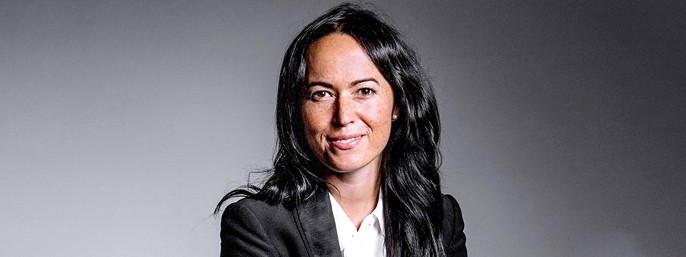Expert: Prime example of bad leadership

This is an English version of Skoleeksempel på dårlig ledelse
The principal of the European Film College, Ellen Riis, maintains that she acted “quickly, with determination,” and that she “has attempted to support the violated party” in the case of a teacher behaving inappropriately toward students.
The teacher ended up leaving the school in March of 2020, but the students were neither told the reason why, nor that he had even been fired. And the student who reported the harassment– who we call “Nadine” – does not feel as though she’s been treated well.
After nineteen-year-old Nadine wrote a complaint to the principal, she was invited to a conversation with Ellen Riis.
“It was a very uncomfortable interview. Ellen Riis doubted my fundamental credibility, even though she assured me of the opposite on several occasions. And it felt as though she was trying to make me responsible for the fate of the teacher,” Nadine says in Ekko #87.
Now, Ekko has come into possession of a complete, 22 minute sound recording from that meeting. Read our commentary and hear Ellen Riis’ response.
Intentions are irrelevant
We’ve presented a transcript to an expert, Ditte Darko, a vocational psychologist and the author of the book Kort og godt om seksuel chikane og Metoo (In short: Sexual harassment and Metoo).
She reckons that the conversation is a prime example of how #MeToo-cases should not be handled.
“It starts out just fine. The principal thanks the student for coming to her and trusting in her own feelings. But the principal then very quickly begins to raise questions about the student’s experiences, and it borders on victim blaming several times,” Ditte Darko says and goes on:
“The principal depicts the teacher as a very loving and caring guy. She says that there’s a big risk of misinterpreting his signals and downright says that the teacher has done nothing wrong from her point of view.”
“The Danish Working Environment Authority’s definition of harassment states that the intention is irrelevant. If the student feels that her boundaries have been crossed in a way that she experiences as humiliating or degrading, this must be taken seriously and not brushed aside as if she simply misunderstood everything.”
The principal had already spoken to the teacher regarding the complaint prior to meeting with the student. That’s a breach of the harassed person’s right of confidentiality, Ditte Darko ascertains.
“The job of a leader is to create a space in which one can be confident, with a high degree of psychological comfort where you dare to talk about your experiences without being afraid of losing face or being punished for expressing concerns. That’s ruined when Ellen Riis passes this on to the teacher without consent.”
“Imagine if the student doesn’t want the teacher to know that she has complained. This case is precisely about the teacher punishing students who won’t do what he wants them to do.”
Thorough complaint
Ellen Riis tells Nadine that she has asked the teacher to “reconsider his body language and how he spends time with students”.
“Perhaps she’s trying to appear resourceful, but it seems more like she’s trying to shut down the case as quickly as possible and with the fewest possible consequences,” Ditte Darko assesses.
“When a nineteen-year-old has written a thorough and very serious complaint about her and others having been subjected to inappropriate behavior for years and that she feels afraid at school, the principal should first listen to the violated parties and then investigate if the charges prove accurate. Instead, she immediately goes to see the teacher.”
“Telling the teacher to be aware of his body language is fine, but when the principal has clearly been aware of his problematic physical behavior, she should have done something about it long ago.”
Students shoulder the responsibility
When the student doubts that Ellen Riis’ conversation with the teacher will solve the problem and tells her that other students are in the process of documenting their experiences with the teacher, the conversation takes a new turn.
“I thought this was a conversation and this was an e-mail between you and me. And that we would figure things out,” Ellen Riis says, and asks which steps Nadine thinks ought to be taken.
“That’s not okay. She needs to prove her mettle here and say: ‘Thank you, we’ll handle it!’ She can’t put the responsibility on the student, as that can make her feel guilty about saying that the popular teacher ought to be fired,” says Ditte Darko.
“When Nadine complains about him, she is probably already afraid that she might be perceived as disloyal by the other students and teachers. It doesn’t make it any easier that she then needs to decide the teacher’s fate. She shouldn’t be put in that extremely difficult situation at all.”
Referred to a psychologist
To solve the conflict, Ellen Riis suggests that Nadine talk to the teacher and the principal about the matter. Nadine doesn’t want to, and then Riis brings up a psychologist who is affiliated with the school.
“We have John Row, and I think you should have a talk with John Row because he is a professional from the outside. And I would like him to kind of give an evaluation from a professional side. Because … I am loyal to all the teachers,” Ellen Riis tells Nadine and adds:
“From my point of view, I have to have someone listen to you and help me make decisions.”
Nadine tells Ekko that the conversation with the psychologist makes her feel insecure.
“John Row tells me this story about not judging anyone on the basis of singular actions. It feels as though he’s trying to make me question my judgment regarding the teacher. Both John and Ellen make me feel guilty that I told them about some very uncomfortable experiences. They should have supported me,” Nadine says.
According to Ditte Darko, the way the psychologist was involved is also a serious mistake.
“This is a breach of the psychologist’s professional confidentiality and an example of very poor leadership. Even if the psychologist did not report back to the principal, it’s going to be very difficult for the student to trust John Row when the conversation is presented to her on these terms,” she says.
Things don’t improve when, near the end of the conversation, the principal encourages Nadine to never be alone with the teacher and to only meet him in places where other people are present.
“You need to be able to draw a line, but in this context, it sounds as though the principal is once again shirking her responsibilities,” Ditte Darko says.
“As a leader, it’s her responsibility to make sure that these violations do not take place. This is not acceptable.”
Insightful study
Ditte Darko believes that the conversation at the European Film College in Ebeltoft shows the mechanisms that cause leaders to handle harassment cases in a problematic manner.
“Studying this conversation is very insightful. It contains a lot of examples of serious mistakes that leaders make in these kinds of situations. A lot of managers aren’t equipped to handle harassment cases and that’s a big problem for employees and students in this case,” Ditte Darko says.
“In a best-case scenario, the principal tries to understand the incident from both the student and the teacher’s points of view, but during this conversation, it sounds as though her loyalties lie with the teacher. That’s a major mistake, because it can deter students from confiding in her in the future.”
Folk high schools and creative learning institutions are particularly vulnerable to harassment cases. It’s normal to have an intimate mentoring relationship with a teacher, and for the line between personal and professional to become blurred, Ditte Darko explains.
“In the creative world, you cross a lot of boundaries together and get on very friendly terms. But when this gets out of hand, it can destroy mutual trust. That’s why it’s important that leaders, particularly in these institutions, make a serious effort when handling harassment cases. Ultimately, it’s their responsibility.”
Translated by Sidsel Pedersen Minuva
The European Film College Case

2016, August
“Diego” is employed as a teacher at the European Film College.
2016, autumn
Several students experience Diego’s inappropriate behavior.
2017-2018
Student catches Diego having sex with a female student in a classroom. Diego’s relationship with the student “Eva” is well-known at the school.
2018, February
Ellen Riis is employed as principal.
2018, August
Eva moves into Diego’s school apartment. This is discussed between the teachers, but Riis accepts the arrangement.
2018, August
Teacher Pia Bovin allegedly tells Riis about problems regarding Diego, a claim that Riis now disputes.
2020, 17th of February
“Nadine” complains about Diego in an e-mail to Riis.
2020, 19th of February
The student Nadine is called in for a conversation with Riis and sent to a psychiatrist, where she feels as though she’s being assessed.
2020, 28th of February
Five students contact school management, telling similar stories about Diego.
2020, 2nd of March
During a meeting where the entire school is present, Riis says that Diego is leaving the school, without giving an explanation.
2020, 7th of April
Pia Bovin is dismissed by the principal.
2021, 18th of February
Ekko #87 is published, containing a major article and interview with Ellen Riis.
2021, 16th of March
Ekko publishes an excerpt of a sound recording in which Riis refers the violated student to a psychologist in order to receive a professional assessment.
The European Film College Case in Ekko

Coverage of the #MeToo-case at the European Film College in Ekko #87.
Receive a free gift when you buy a subscription.
Buy the magazine in kiosks or get it delivered.







Kommentarer